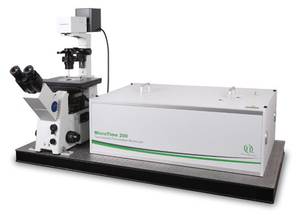
M47 - FLIM - Picoquant Fluorescent Lifetime Imaging Microscope
System Description
FLIM measures the time a fluorophore remains in an excited state before emitting a photon. This so-called fluorescence lifetime is a characteristic parameter of each fluorescent dye or molecule that may change with its nanoscopic surroundings or its conformational state. Lifetime information probes the molecular environment for its composition, such as ion concentration, pH, lipophilicity, or the binding to other molecules.
Lifetime information is independent of fluorophore concentration, so FLIM can be very useful for functional imaging in terms of investigating molecular function, interactions, and environment. Biosensors can also be exploited with FLIM to study cellular microenvironments. FLIM can be used to discriminate fluorescence probes that have overlapping emission spectra and eliminate unwanted background signals.
It also allows highly accurate FRET imaging, eliminating the crosstalk and/or bleaching problems inherent to standard ratio metric FRET imaging, and it provides an elegant tool for (time-resolved) anisotropy measurements.
This microscope, although officially belonging to VBCF, can be used by IMP-IMBA-GMI users as any other system of the BioOptics facility, without any extra costs. The system is situated in VBC6, room E32A.
Microscope frame
Olympus iX71 inverted microscope frame
Excitation
Laser: 440 nm, 510 nm
Objective lenses (Olympus)
PL 20 x PlanAchromat Objektiv, NA = 0.4
PL 40 x PlanAchromat Objektiv, NA = 0.65
UPLSAPO 60 x Ultra-Planapochromat, NA = 1.2 (water immersion)
PLAPON 60 x Plan Apo, NA = 1.42 (oil immersion)
Filters & Beam Splitters
These vary according to the experimental demands. Any common (and many uncommon) filter / beamsplitter combinations can be installed.
Detector
Hybrid Photomultiplier Detection Assembly with < 50 ps time resolution
Analysis Software
SymPhoTime 64 (more details on the Picoquant webpage)
External Links
More information on TCSPC theory and data analysis available on a Picoquant Wikipage
Further information also available on the VBCF Homepage
Reservation & Training
If you wish to use, or learn more about this system, please fill in a PPMS request in order to arrange the training. Reservations can be done via PPMS.
